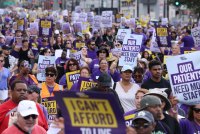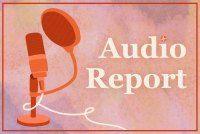Latest California Healthline Stories
Mothers of Color Can’t See if Providers Have a History of Mistreatment. Why Not?
Many women, especially Black women, have reported discrimination in maternity care, but expectant mothers lack tools to see where this happens. Funding and regulations to measure disparities have been slow in arriving, but some innovators are trying to fill the void.
New Medicare Advantage Plans Tailor Offerings to Asian Americans, Latinos, and LGBTQ+
As more seniors opt for Medicare Advantage, a few small insurers have begun offering plans that provide culturally targeted benefits for cohorts including Asian Americans, Latinos, and LGBTQ+ people. The approach, policy researchers say, has potential and perils.
Nuevos planes de Medicare Advantage adaptan ofertas para asiáticos, latinos y LGTBQ+
A medida que Medicare Advantage gana popularidad entre los adultos mayores, tres compañías del sur de California están lanzando nuevos planes que se enfocan en comunidades culturales y étnicas, con ofertas especiales y profesionales que hablan su idioma nativo.
Massive Kaiser Permanente Strike Looms as Talks Head to the Wire
Both sides, still at loggerheads over pay and staffing, agreed to keep bargaining after unions announced a possible strike Oct. 4-7. If no deal is reached, a walkout by about 75,000 KP workers in five states could disrupt care.
Cuando pienses en tu salud, no te olvides de tus ojos
Muchos planes de salud cubren los exámenes de visión de rutina, pero estos generalmente no incluyen el tipo de examen que se utiliza para recetar anteojos y lentes de contacto.
When You Think About Your Health, Don’t Forget Your Eyes
Americans think losing their eyesight would be one of the worst possible health outcomes, yet millions lack a fundamental understanding of eye health.
California Lawmakers Approve Nation-Leading $25 Minimum Wage for Health Workers
A sweeping agreement approved by state lawmakers would gradually raise the minimum wage for hundreds of thousands of health workers to a nation-leading $25 an hour. The pact would also end labor’s years-long battle with dialysis clinics.
Legislature Passes Newsom’s Proposal to Retool Mental Health Services Act
The California Legislature greenlighted Gov. Gavin Newsom’s latest plan to build more housing and increase addiction treatment as part of his response to the state’s homelessness and drug crises.
‘Dr. Google’ Meets Its Match: Dr. ChatGPT
With the rise of generative AI, people who once turned to “Dr. Google” to check on medical symptoms are now turning to chatbots. Researchers say the bots are often more accurate, but urge caution in the absence of any regulations.
Journalists Discuss Dangerous but Little-Known Disease, Heat Deaths, and Doctor License Fees
California Healthline ethnic media editor Paula Andalo appeared on Radio Bilingüe to explain why doctors want more done to combat Chagas disease. Contributor Stephanie O’Neill Patison reported an increase in heat-related deaths and a proposal to increase doctors’ licensing fees.














